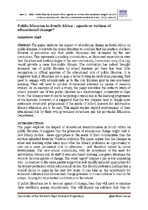Public libraries in South Africa: Agents or victims of educational change?
Abstract
The paper explores the impact of educational change in South Africa on public libraries. It surveys the recent literature to conclude that the position of school libraries is precarious and that public librarians feel victimised by the new curriculum. This represents a puzzling contradiction, as librarians’ expectations were that the ethos and methodologies of the new curriculum, Curriculum 2005 (C2005), would provide a more favourable climate. The curriculum has indeed brought increased use of public libraries by school learners yet there has been little recognition in official quarters of the educational role of public libraries. It is suggested that, if librarians are to gain a better footing in curriculum planning, they need to engage with educationists as to the role libraries play in resource-based learning. They will need to provide documented evidence by means of research studies. As an example of such a study, the paper describes the author’s study of school learners’ use of two public libraries in a disadvantaged community in Cape Town. The libraries were found to be playing a crucial role in the learning programme of the learners. However, it is suggested that the two libraries need to design more systematic structured programmes if the needs of school learners for information literacy education are to be met. This might require explicit endorsement of their educational role by their own governance structures and the provincial Education Department.

